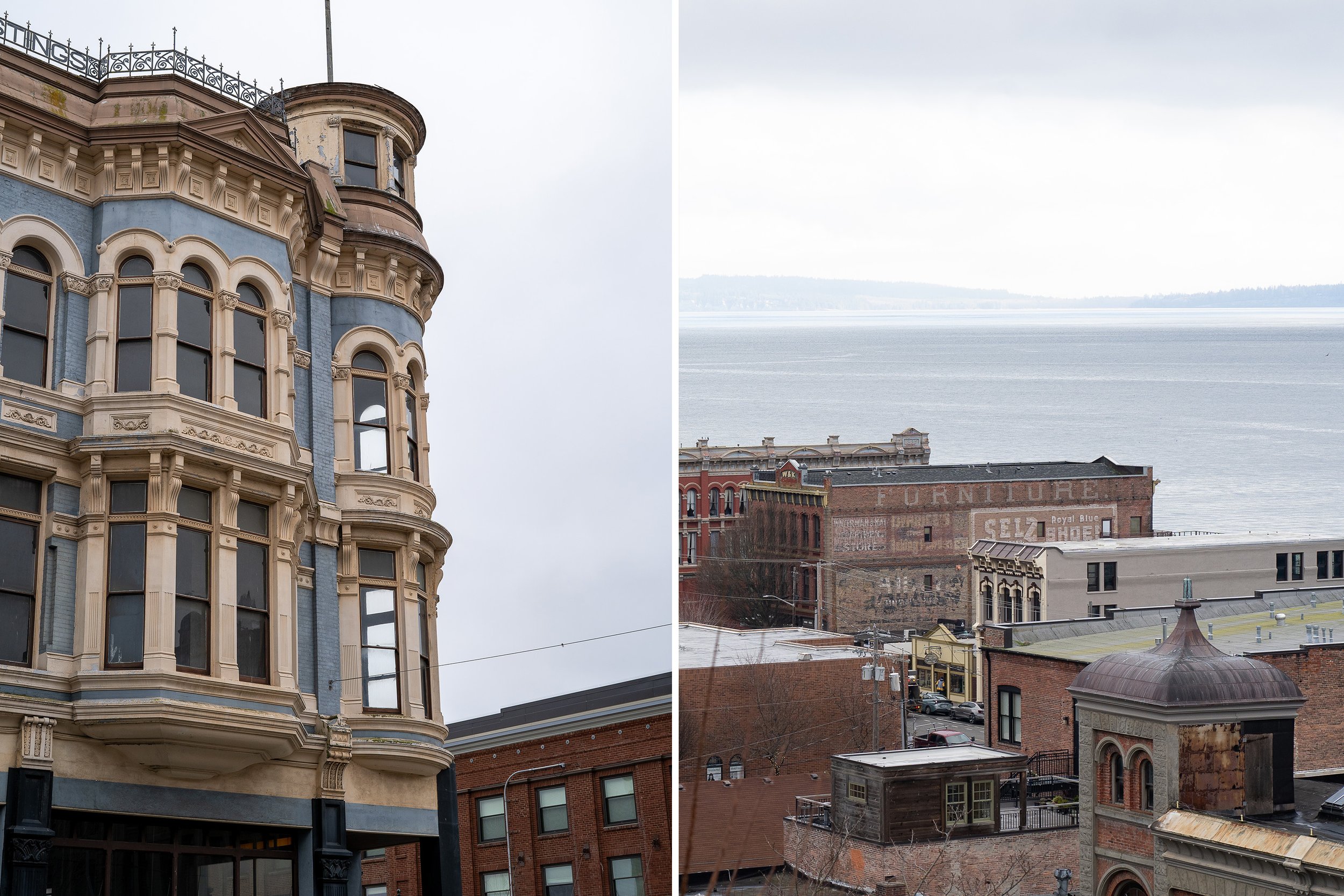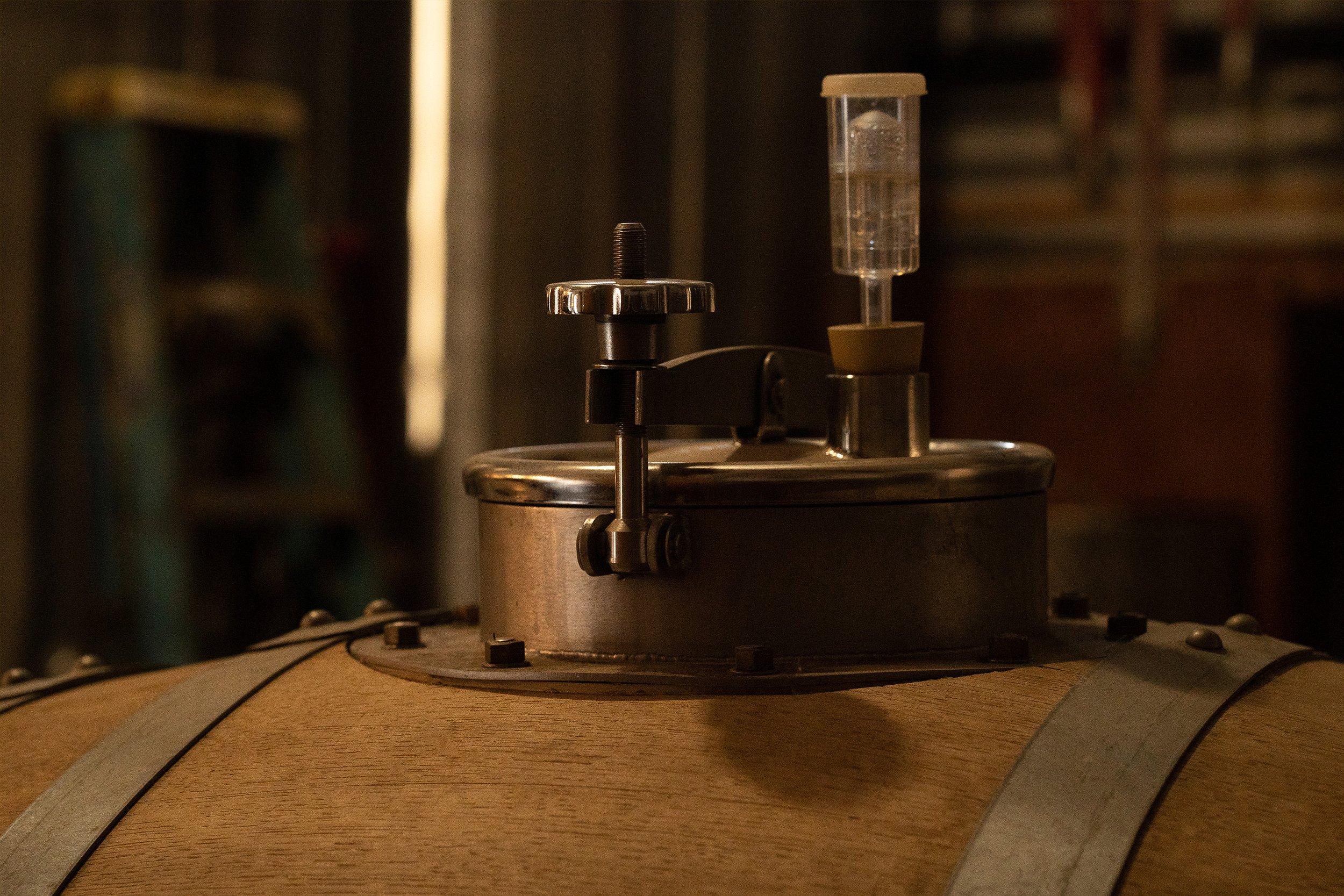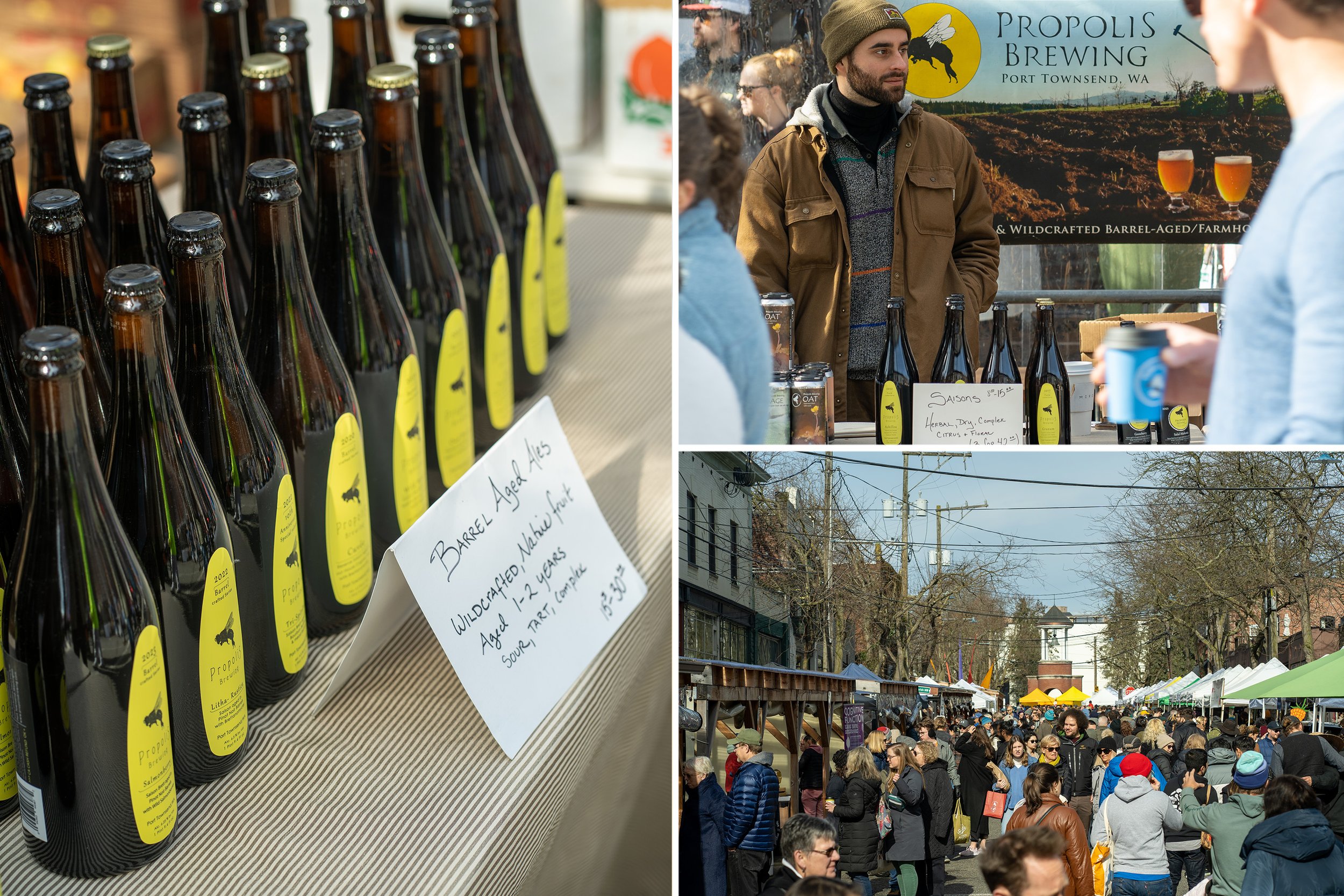A life at sea does something to a person.
It forces presence: nothing before or behind you but the next passing wave, and then the next one, and the next. The nautical path is paradoxical, inherently insular yet opening passage to the whole wide world. This can build intentionality, and reverence for what is forged over time by forces greater than oneself. And it can also make you a little strange.
Nowhere is this clearer than Port Townsend, Washington. Surrounded by water, born of a boating industry, and populated by creative types, the city’s motto is “We’re all here because we’re not all there.” Perched on the northeastern tip of the northwestern corner of the U.S.’s most northwestern state, it’s a two-hour car and ferry trip from Seattle, and feels farther than that. Locals say nobody ends up here by accident, and if Port Townsend calls, you may never leave.
Proud ambassadors of the Port Townsend bizarre are Piper Corbett and Robert Horner, the co-founders (and only permanent employees) of Propolis Brewing, where they make handcrafted, mixed-culture, botanical Ales. Partners in work and life, they’re as inextricable from the 10,000-person city’s unique ecosystem as the ingredients they forage, grow, and locally source. In a tiny taproom and production facility on a sun-dappled garden where Puget Sound meets the shore, they make beer that tells the stories of strange lives in a strange land.
Port Townsend and its people have never been ones to conform. The bustling coastal city was poised to become one of Washington state’s primary hubs, named Puget Sound’s Customs Port of Entry after settlers displaced the Indigenous Klallam people and other tribes in 1851, meaning every arriving ship had to stop here; in the late 1800s, it was the second-busiest port city after San Francisco. A railroad connection was repeatedly promised to open the peninsula to points south and solidify its role as a jewel in the state’s crown.
There was just one problem: The trains never came. The railroad companies kept overbuilding and running out of money—and so did the locals, depleting local timber in building the town and constraining the logging and shipbuilding industries in the process. Isolated from growing cities like Seattle and Portland, things at the tip of the peninsula began to get … well, weird.
Locals called it the New York of the Northwest, yet in 1856, a U.S. Treasury Inspector found the town squares decorated with animal bones, saying you could tell you had arrived in Port Townsend by the smell. By the 1880s, it was the center of a growing Canada-to-U.S. opium pipeline directed and traveled by smugglers, kidnappers, crooked customs-house inspectors, and more nefarious types. “Bodies found floating in the bay kept the Jefferson County coroner busy,” writes Katrina Carrasco, “and the barely legal entertainments that catered to a population of sailors and stevedores made the town a perfect study of late-1800s vices.”
People here may not have been all there, yet they were resourceful. Without a single industry, they got by on a mix of activities, from agriculture to saloons serving passing sailors, and the city grew slowly but steadily. The tide turned in 1928, when a paper mill helped revitalize the local economy. Dope dealers, corrupt officials, and salty sailors began to be replaced by artists and artisans, cultivators and craftspersons, masters of obscure arts and trades. A tourist market developed around the town’s historic waterfront and magnificent Victorian homes.
But it was never going to be normal.
“Port Townsend was the end of the line,” Corbett says, a place people came to disappear. It remains where many go when they don’t belong anywhere else, like an island of misfit toys for eclectic adults.
Asking someone how many jobs they have is a standard opening line here, says Corbett. Boat-building and repair is still a major industry, but there are also painters and ceramicists; farmers, gardeners, and chefs; even manufacturers of rare oboe reeds. Port Townsend is the bow-making capital of North America, drawing people from all over the world to apprentice with masters of violin, viola, and cello accessories unparalleled outside Europe.
Renowned cheesemaker Mt. Townsend Creamery was located here before closing in the pandemic; I visited in its final days with Brian Gilbert, my friend and former partner in a cheese-pairing events business. Before slinging fromage for more than a decade at Seattle’s Beecher’s Handmade Cheese, Gilbert was forged by Port Townsend, living there for much of 2001 to 2012, discovering a life-changing love of cheese when he got a job at Mt. Townsend. Naturally, he also made bread, baked cookies, and managed a café.
“Propolis is the most Port Townsend thing that Port Townsend ever Port Townsended. It’s figuratively off the grid in that it generates its own imaginative energy and finds its own creative path of least resistance.”
Gilbert calls the city the place of anti-hustle, where everyone takes it slower, cobbling things together to collectively float by. “I was getting the feel of what it was like in the ’70s from working there in the 2000s,” he says. “It felt like there were only 10 businesses and they all [did everything.]”
Yet collectivism can easily become protectionism; people don’t make eye contact much here, Gilbert says. At the time, out-of-state transplants were starting to trickle in and drive real estate prices up, referred to by side-eyeing locals as “the Californicators.” Yet as a place that celebrates difference, there is the ability to lose yourself or find yourself in Port Townsend. And everyone, from hippies and loggers to Californicators, gathered at the Town Tavern, which later became Water Street Brewing (before eventually closing), paving the way for an even more local kind of brewery to cater to the eclectic crowds.
“Propolis is the most Port Townsend thing that Port Townsend ever Port Townsended,” says Kendall Jones, author of the Washington Beer Blog. “It’s figuratively off the grid in that it generates its own imaginative energy and finds its own creative path of least resistance.”
Corbett grew up here; it’s hard to say whether the place shaped her character, or if it simply attracts similar energy. People can create the life they want, no matter how seemingly bizarre, she says. It’s a community capable of holding many things at once, finding value in the old, yet supported in the new. Her mother opened the city’s first espresso stand, but she was also an archivist.
It’s a mindset she and Horner brought to their beermaking. While Propolis brews historical styles such as medieval Gruits, they’re not re-creations so much as reinterpretations, the pair say. They infuse traditional beers with personal, natural, and local stories, products of patience that demand the same attention. Both possess a methodical intentionality born of coastal proximity, descended from detail-oriented lineage.
“There’s a mindset here about taking the time to do things the right way,” Corbett says. “That’s a big part of the ethos that drives us.”
In some ways, Corbett couldn’t have ended up anywhere else, doing anything other than this.
Her mother was raised in a German military family that never stopped moving, and the Corbett children literally grew up on boats. They moved from California to Port Townsend when she was young, but summers were spent sailing the Inside Passage to Alaska on a refurbished Edwardian-era houseboat owned by her grandparents—who would sell it every time upkeep got onerous, then buy it back again (four times in total). Named the Lotus, it’s now a floating hotel and events center and National Historic Place, docked in Seattle’s South Lake Union.
For a while, Corbett’s single mother moved the family from place to place, even living briefly in a Sufi community. When they finally settled, it was at the end of the longest dock on a schooner with no mast in the city at the end of the line. The weather was wetter back then, and Corbett and her siblings had to be mindful not to get blown off the dock. Eventually, they moved into one of the city’s quirky old homes, and their mother remarried to a master rigger and poet who hugely influenced Corbett; Propolis even uses one of his riggings in its transfer lines.
Still, there weren’t many other children to play with, so Corbett befriended nature, climbing cedar trees and swaying in the wind. As a young Pacific Northwesterner, she says, these experiences are stamped upon your nervous system, surfacing later in life: the mystic wonderment of getting lost in woods; gathering flowers and moss as golden light filters through feathery pine to paint patterns on forest floors. It was a strange yet beautiful way to grow up, immersing her and her siblings in a deeper ecosystem.
“One of the first experiences I remember … is going into the woods, collecting berries, and interacting with nature,” she says, recalling lush landscapes where the salmon spawned so plentifully they could catch them with their hands; glimpsing wildlife like wolves and bears through thickets of trees and aromatic herbs. I picture her like a feral child, cheeks flushed and hair wild, holding fistfuls of flowers with purple berries smeared around her smile.
After high school, Corbett moved to New York, pursuing acting and working at an upscale flower shop, but she missed the clean air and dark, rich soil; the open, spacious character, everything a little slower and softer. Eventually, Port Townsend called her home. At the same time, Horner was fleeing Seattle, and the two found an energetic match in the place, the people, and each other.
Horner was born in England and raised in the Midwest, the son of a homebrewer and grandson of a draft technician. He moved to Seattle to work in architecture and started a business doing public art commissions, but he also inherited the homebrewing gene, and beer was always humming in the background, along with a desire to leave city life behind. When his business got him that rarest of commodities, work in Port Townsend, he took to the culture immediately: living in a tent on a friend’s property in frigid winter, making beer and mead out of the adjoining house’s warmest space, the water-heater closet.
Corbett and Horner met in January 2012 at the opening of a taproom, local institution The Pour House. “We were both drinking Belgian beers, and we both had giant Nikon lens cameras,” Corbett recalls, and “became friends over … garbanzo-bean salads with fresh-seared deer heart and liver, flip-top bottles of Robert’s homebrew, and picking native Nootka roses to made mead together.” Six months later, they opened the brewery.
They named it Propolis Brewing after the resinous substance honeybees use to build hives. Their intent was to make both beer and mead, but Washington state requires a winery license for the latter. So they assumed the roles they still play 10 years later: He brews beer while she gathers and grows, bringing the place they love to painstaking life in each handcrafted bottle.
“The beer is simply beautiful … like a work of art reflecting the maker’s soul,” says Jones. “They are a direct reflection of Robert and Piper ... I sometimes worry that the too-often cold and contrived beer business is no place for such authentic and intentional people.”
Booths cluster under the awning as if huddled against the winter wind blowing in from the water. Gilbert and I slide wooden tokens across the counter to fill our tall tasting glasses. We clink them together, take a sip—and squeal with horror. I spit it out; he dumps it, but we’re laughing the whole time. We go to the next booth and do the whole thing again. At the third booth, we smile, agreeing: “It’s weird, but I like it!”
This is Strange Brewfest, the beer festival that typifies this town. All styles are welcome; the only rules for inclusion are that the recipes must be strange. People merrily sample bizarre beers that both delight and disgust, from Curry IPA (my 2019 favorite) to Hotdog Water; last year’s winner was Double Bluff Brewing Co.’s French Onion Soup. Jones recalls the Grand Salami from Anacortes Brewery, which tasted like a salami sandwich, with flavors of mustard and rye bread. Propolis’ submissions have included beers like Flora Phonic, a hibiscus, chamomile, and rose petal Saison, and Banana Boat, a Belgian-style Quad with banana, cardamom, and vanilla bean—beers less about courting disgust than celebrating less common botanical flavors.
Back when the brewery opened in 2012, even farmhouse beers were considered pretty weird. “No one knew what a Saison was,” Corbett says; at the time, “Belgian” meant big, heavy, and boozy. “We wanted [to create] something you could really savor … which was not mainstream, and certainly not popular, either.”
“Similar to single-variety hops, we like to feature single-variety ingredients in our beer.”
The pair have always gone against the grain, from styles and methods to packaging. They don’t have a single IPA on their taplist, instead making Oak-Aged Sours, Flemish Browns, and Farmhouse Ales that defy easy categorization. While they now can a few of their most popular beers, they opted for 750ml bottles even through the 22oz bomber craze.
This, combined with Port Townsend’s growing tourist industry, attracts a range of customers who are just as eclectic as the beers on offer. “We have people seeking us out from across the country … who come for an experience, tasting through a portfolio of beers,” Horner says. Others wander in from the nearby hotel and “are really disappointed that we don’t have a Triple IPA or Peanut Butter Stout.”
Some of their beers are homages to medieval Gruits or even more ancient Ales, and like those early brewers, Horner and Corbett use what is foraged and found, grown in their garden or procured from local farms, making beers meant to inspire slow, soulful presence. Most are bottle-conditioned and aged, and some are years in the making, done by hand in small batches—initially, in a one-and-a-half-car exposed garage, where their first Great American Beer Fest-winning beer was brewed in whipping wind and soaking rain.
The farmers market was a natural starting point for the nascent brewery, and every weekend in the early days, Corbett and Horner filled their Volkswagen Jettas to the brim with bottles and drove to Seattle’s largest markets. There they got face time with customers who could ask questions and give direct feedback, inspired by the bounty of neighboring producers. The trips were a good way to connect with beer drinkers in the big city—even if they looked forward to beating a retreat to Port Townsend afterwards.
“We don’t live in the city, we live here, because we like being close to nature. I get excited about the first nettles coming up in spring, the lemon balm in late summer … and the progression of the berries,” Corbett says. “It’s a more cyclical, holistic way of living.”
It reflects Corbett’s own life: When the air warmed and the sun began to slant through the windows in northwestern Washington late into the evening, it was time to set sail for Alaska’s ivory peaks. Months later, as the trees on the horizon began to burn ochre and orange, they headed home, where brilliant tomatoes of similar hue replaced plump berries.
In folklore and tradition, nettles are a threshold guardian, used as funeral shrouds; the mother’s nurturing energy guarded with a sting. They’re also nutritional powerhouses, used for everything from soups and salads to ice cream, but every Pacific Northwestern kid has memories of raw, red legs after brushing against the wild plant in shorts. And they’re a staple of Propolis’ beers, the pair’s personal life, and Port Townsend’s culture.
“Similar to single-variety hops, we like to feature single-variety ingredients in our beer,” Corbett says, including unique berries like Saskatoon, red huckleberry, thimbleberries, and Oregon grapes (or mahonia). Her grandmother worked as a strawberry picker on nearby Bainbridge Island, internationally renowned for this fruity bounty, and “when I’m out in the fields, I feel this deep, ancestral connection to my grandmother, finding beauty and joy in picking berries.”
The beers have terroir you can taste: alder trees and moss; a nearby apple orchard with rich, dank soil; the resiny citrus of spruce and lemon balm; the floral minerality of calendula or roasty richness of chicory. Some incorporate herbs thought to help offset some of the less desirable outcomes of alcohol, such as burdock and dandelion. And they open like wines, with delicate mid-notes that shift across your tongue.
The wood they age in is as essential an ingredient as any botanical. Part of the joy, Corbett says, is “finding these incredible barrels of sangiovese, merlot, and syrah from local producers … finding the notes in their wine and how to play with that [by] combining wild yeast and berries.”
Anyone can make a Saison with local ingredients, Corbett says, but the flavor profiles are what make it yours, shaped by the type of water and the way it plays off your yeast. They use blends of French, Belgian, and indigenous yeast and microbe cultures, including wild Brettanomyces strains native to the nearby Olympic Peninsula. The water is from the Olympic Mountains, mineral-rich and clean, requiring no additions.
“Our beer disappoints the real funky, Sour-heads,” Horner says. But Port Townsend people don’t aim to please—they tell their own stories, trusting that those who resonate with them will follow.
Today, they work in the 20-barrel brewhouse behind the taproom that’s more like a Victorian garden, light-filled and crawling with vines. When we arrive, jazz wafts from a record player behind vintage furniture, the scene looking ready for tea service. They recently added a cask engine, an ode to Horner’s British heritage, from which I sipped a roasty, earthy chaga mushroom Stout.
“We wanted to create a product we were proud of, and an environment that felt healthy,” Corbett says. “[The taproom] isn’t loud and rambunctious. We’re listening to interesting, eclectic records and having thoughtful conversations. It’s a space to really slow down and appreciate the smells and tastes.”
Time is paradoxical like Port Townsend; entirely illusory, yet etched in glacial valley and alpine edifice, cutting across foreheads in deep grooves. Sometimes the ocean demands all hands on deck, and Corbett and Horner hit the ground running, recalling the early days hand-bottling, capping, and corking 400 cases of beer in the garage. They’ve been engaged for nearly a decade because they say they never found time to tie the knot.
“Sometimes it’s the coldest, wettest winter, and everything seems really slow, but the same beautiful, bright faces show up, and we really start to feel the impact of this community we’re creating.”
Yet time has a way of making itself felt: Both were in separate, serious car accidents in 2020. Corbett was bedridden for nearly a month, then had to use a walker. “Things like that give you perspective,” Corbett says. “We’ve learned the value of slowing down for ourselves, and tried to create this environment for our beer and everyone else.”
Port Townsend has shifted, too. “We’ve definitely had an influx of humans in the past few years,” Corbett says, and while they’re grateful people want to move here, housing costs are skyrocketing, pricing out the locals who build lives like patchwork quilts. Some fear it could make things a little too, well, normal.
All change involves the inherent tension between what to keep and what to let go of. Some local brewers have called the pair overly protective, even paranoid, about their recipes and preparations. But for Corbett, protecting the brewery’s recipes is about preserving her and Horner’s relationships to the land and their processes.
“When you’re creating a product, you’re telling a story about your home, culture, and food, and it’s only authentic when it comes from a place that is sincere,” she says. She compares other breweries making beers with nettles and flowers to the ’90s-era grunge phenomenon, where people outside the Northwest donned wool and plaid-flannel, saying, “[They] called it ‘fashion,’ but here, it was just what we wore.”
They support people making strange beer, but want to see the industry start getting more personal. Corbett says she has nothing against Pastry Stouts, but “I want to know about your grandmother’s snickerdoodle recipe and why you thought you should turn that into a beer,” Corbett says. “That’s really where it gets fun, rich, and interesting.”
Yet even they are adapting to the times. They recently added mobile canning, allowing them to appeal to a different type of beer drinker, Horner says. Their dry-hopped Pilsner with spruce tips and Stout with chicory and dandelion have had crossover appeal, and they hope these can be a gateway to beers like Melissa: a dry-hopped Pilsner with lemon balm, a bright yet bitter herb that functions like hops. “It has a lot of earthy, grassy, citrus notes that you might find in an IPA,” Horner says.
They call it a “conversation we’re having with the beer community,” taking what they like from popular styles and putting their own unique spin on them. Their favorite moment is watching people realize, in real time, that beer can be more than they believed. They rebrew some of their best-selling styles, but each has a vintage: a snapshot of the present moment, preciously fleeting. “Most of our beers are … going to change, because the barrels evolve, and the culture evolves,” Corbett says.
It’s what they hope will happen in beer culture, someplace they always felt outside of, looking in. They created the beer and taproom they didn’t see for others like them, building a loyal, local following. “Sometimes it’s the coldest, wettest winter, and everything seems really slow,” Horner says, “but the same beautiful, bright faces show up, and we really start to feel the impact of this community we’re creating.”
Organic growth is unpredictable, and it requires learning where to compromise and hold firm; when to protect and open up, just like the nettle. Relationships bloom like the lemon balm that speckles the peninsula’s landscape when everyone can hear each other’s unique, authentic story. In sharing theirs, Propolis and Port Townsend invite us to pull up a chair, put a record on, and slowly savor life in all its strange glory.















































